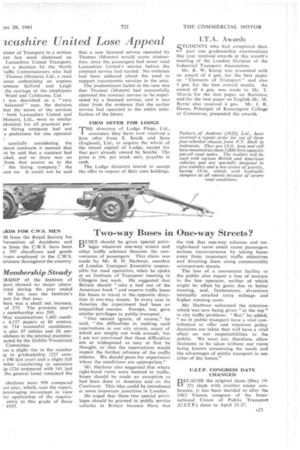Two-way Buses in One-way Streets?
Page 25

If you've noticed an error in this article please click here to report it so we can fix it.
BUSES should be given special privileges wherever one-way streets and other traffic schemes threaten the convenience of passengers. This claim was made by Mr. B. H. Harbour, member of London Transport Executive responsible for road operation, when he spoke at an Institute of Transport meeting in Glasgow last week. He suggested that Britain should "take a leaf out of the American book " and reserve traffic lanes for buses to travel in the opposite direction in one-way streets. In every case in America the experiment had been an unqualified success. Europe, too, gave similar privileges to public transport.
"One cannot ignore, of course," he said, "the difficulties in making such reservations in our city streets, many of which are simply not wide enough, but I am not convinced that these difficulties are as widespread as may at first be thought, or that the reservations would impair the further advance of the traffic scheme. We should press for experiment where the conditions are appropriate."
Mr. Harbour also suggested that where right-hand turns were banned to traffic, buses should be made an exception as had been done in America and on the Continent. This idea could be introduced at some important junctions in London.
He urged that these two special privileges should be granted to public service vehicles in Britain because there was the risk that one-way schemes and noright-hand turns could cause passengers serious inconvenience by taking buses away from important traffic objectives and diverting them along commercially unimportant streets.
The loss of a convenient facility to the public also meant a loss of receipts to the bus operator, neither of which might be offset by gains due to better running, and, furthermore, diversions normally entailed extra mileage and higher running costs..
Mr. Harbour welcomed the attention which was now being given " at the top" to city traffic problems. "But," he added, "we in public transport have a vital contribution to offer and whatever policy decisions are taken they will have a vital effect on our responsibilities to the public. We must not, therefore, allow decisions to be taken without our views being known concerning the needs and the advantages of public transport in our cities of the future."




























































































